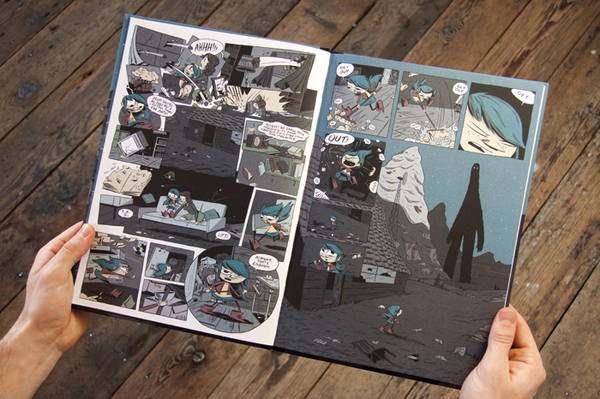
East London's Nobrow Press sent me a review pack last week, including a couple of kids' comics featuring Luke Pearson's Hilda. Poesy is almost four, and we recently graduated from wordless comics (like Régis Faller's Polo) to Art Spiegelman's wonderful Jack and the Box, and I was curious about how she'd like these. My own cursory inspection at the post-office box made me optimistic, as the art was really up both our streets. The jacket copy cited Tove Jansson (Moomins) and Hayao Miyazaki (Kiki's Delivery Service, My Neighbor Totoro), and it was clear that both comparisons were apt, visually, at least.

I unpacked them that night and left them by the sofa, and Poesy picked them up on her own and promptly demanded that I read them to her. I started with Hildafolk, a slim, staple-bound introduction to the character, and we were both instantly hooked. Pearson's matter-of-fact introduction to Hilda — a young girl who lives with her mother in a remote cabin in the middle of a valley filled with odd, mythical creatures — was a perfect way to plunge us into the magic. Hilda is about to go draw some rocks with her antlered, frisking dog-pet Twig when the Wood Man wanders into the house, bearing some fire-logs. The Wood Man, we learn, is a silent and odd character, something of a pest, who lets himself into Hilda's house and lies silently, depressively, on his back before the fire. He is called the Wood Man because he is made out of wood.
Off Hilda goes, up the mountain, to sketch rocks. She discovers a Troll Rock, which may or may not turn into a troll by night. Hilda's read up on her trolls, so she has Twig tie a jinglebell around the rock's nose-like protuberance, and begins to draw. She nods off, and when she wakes, she is in the midst of a nighttime snowy white-out, and all she can hear is the menacing jingle of the bell as the troll comes to life and begins to stalk her. She runs into the woods, becomes lost, is nearly trampled by an equally lost giant, and then is saved when she spies a super-modernist cabin. She lets herself in, assuring Twig that no one would hold this against her given the circumstances, and finds herself facing down a visible perturbed Wood Man.
The story continues to go up and down the tension-hills, climbing up to suspenseful moments that are inevitably broken up with surreal, kid-friendly, dreamlike comedy. Immediately after we finished it, Poesy fetched the hardcover sequel, Hilda and the Midnight Giant (that's the link for the US edition, which apparently isn't available until May; here's the UK edition, which is available right now).
In Hilda and the Midnight Giant, Hilda and her mother are trying to make sense of the tiny, threatening notes that keep getting slipped under their door. Read with a magnifying glass, each note reveals itself to be an increasingly hysterical eviction notice from a mysterious source — someone or something very tiny, clearly. Then, one night, they find themselves beset by minuscule, invisible assailants who pelt them with rocks and destroy everything in their sitting room. Hilda's mother announces that they will have to move away from valley and its magical creatures, back to the town. Hilda, aghast, begs her mother for a chance to make friends with their assailants, and her mother says that if she can manage this trick, they'll stay.
A tiny voice begins to whisper in Hilda's ear, speaking with odd, stilted formality. This is one of the little people, who reveals himself to be an invisible elf, now perched in her ear. He is invisible to Hilda and her family because they have never completed the paperwork necessary to see them, but he has taken the liberty of filling in the long, onerous forms on her behalf, and if she'd only sign the tiny sheet at the bottom, she'll be able to see them. Once she does, she learns that her house is in the midst of a vast kingdom of ant-sized elves, and what's more, that they have declared war on her and her family. It turns out that the recently elected prime minister campaigned on a promise to rid the valley of her family's presence, and now he has to make good on it.

There's nothing for it. Hilda has to negotiate with the elves to make peace. She starts with the officious mayor, works her way up to the feckless prime minister, and learns that she must make her case with the king. But on the way, Hilda has to unravel another riddle: what is the Midnight Giant? Every night, Hilda spots this figure, a giant as tall as the mountainpeaks, staring silently at her. When she goes to fetch her mother to see this, the giant somehow disappears.
Both of these comics were successful enough with Poesy that I had to negotiate rather forcefully to get permission to take them to the office this morning so I could write this review, and promise very sincerely that I'd be bringing them home tonight for another read (we re-read Hildafolk yesterday afternoon).
Nobrow's books display very fine craftmanship. Even the staple-bound Hildafolk is a beautiful package, and the hardcover Midnight Giant is superb.
A funny postscript: My wife Alice picked up the books after we'd read them and said, "Luke Pearson! He's a genius! He did the art for one of my games!"
Hildafolk: Amazon, Amazon UK, Luke Pearson, Nobrow
Hilda and the Midnight Giant: Amazon, Amazon UK, Luke Pearson, Nobrow






